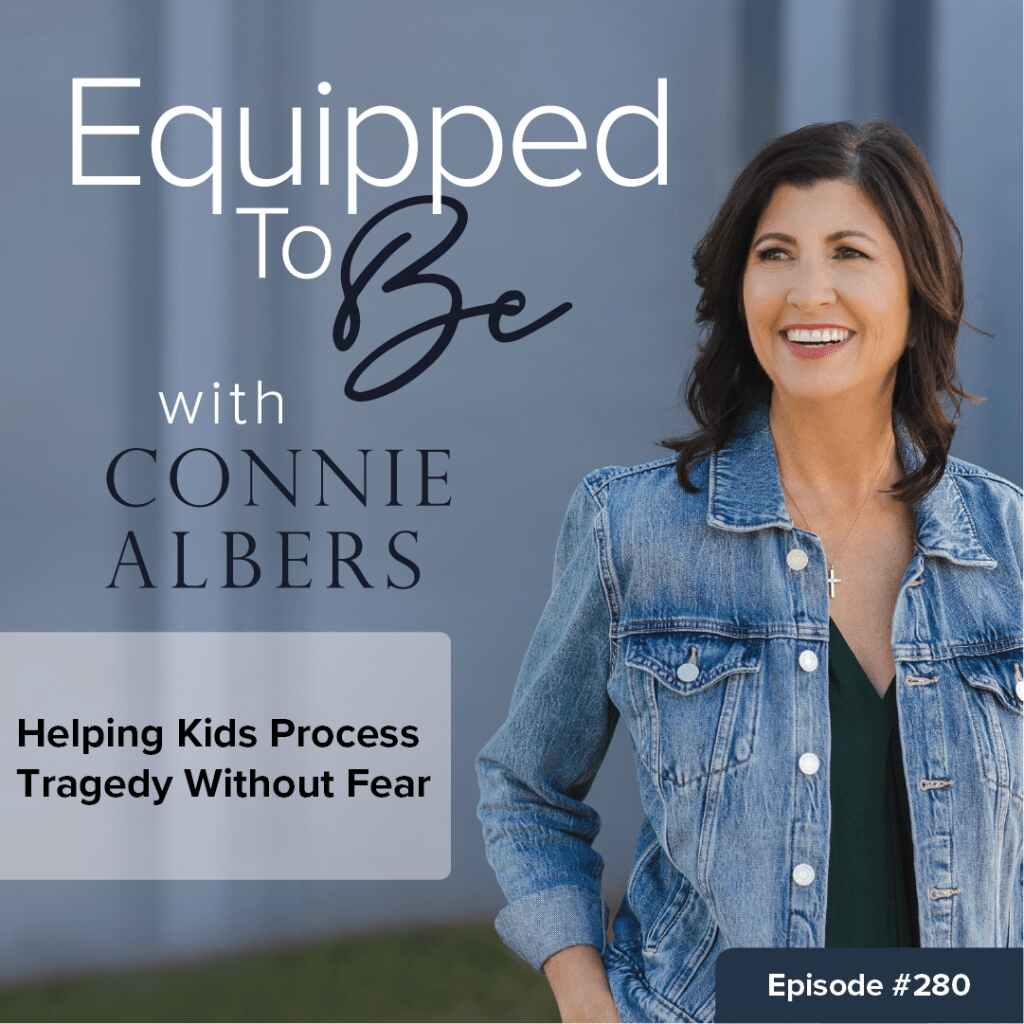Helping Kids Process Tragedy Without Fear begins with parents showing up—not with perfect answers, but with steady presence, listening ears, and hope-filled hearts.
When tragedy strikes, like the recent shooting of Charlie Kirk just a day before the 9/11 anniversaries, parents are left wondering how to explain the world to their children. Do you share the truth? Do you protect them from the news? Or do you simply listen?
The truth is, your children don’t need perfect answers. Instead, they need your presence, your steadiness, and your hope. And the good news is—you can give them that, even in uncertain times.

“Even in tragedy, you can raise children who are not consumed by fear but anchored in truth, wisdom, and love.” — Connie Albers
Why Parents Matter Right Now
Children are always listening. They hear the whispers, see the headlines, and notice the heaviness in our voices. Unlike when 9/11 happened, today’s kids are flooded with instant updates, opinions, and images on social media.
Because of that constant exposure, your role as a parent matters more than ever. You don’t need to interpret the entire world—you just need to help your child process their world. Your calm presence becomes the anchor they can cling to when everything feels uncertain.
Helping Children Feel Safe After a Tragedy
At the core of every child’s worry is one question: Am I safe?
Offer Reassurance Through Words and Routines
Simple words like “You’re safe here with me, and we’ll walk through this together” go a long way. Pair that with routines—like bedtime stories, prayer, or hugs—that remind your child they are secure.
Reduce Fear By Creating a Safe Haven at Home
Even if the world feels chaotic, your home can be a sanctuary. Shielding children from endless news loops or harsh online comments allows their hearts and minds to heal. And when you intentionally limit exposure to endless news loops or harsh online commentary, you are giving their hearts and minds room to heal.
Listening Without Rushing to Fix
When kids ask tough questions—“Why did this happen?” or “Could it happen to us?”—it’s natural to want to give quick answers. But the most powerful gift is your listening ear. But this is one of those moments where less is more.
Validate Their Feelings
You might say, “It makes sense that you feel sad or scared. I do too.” This simple acknowledgment creates a safe place for children to process emotions.
Without this balance, parenting feels incomplete. And as Ephesians 6:4 reminds us: “Do not exasperate your children; instead, bring them up in the training and instruction of the Lord.” That’s compassion and correction working together.
Show You Take Their Thoughts Seriously
Write down their questions together and promise to revisit them later. This tells your child their voice matters and that you will stay engaged in their concerns. By doing this, you’re showing your child that their voice matters and that they don’t have to carry fear alone.
Teaching Wisdom in Words
Tragedy often sparks heated opinions. Kids see this at school, hear it in conversations, and scroll past it online. That’s why now is the time to teach them how to use their words carefully and wisely.
Model Respectful Dialogue
Teach your children that words can heal or harm. Encourage them to say, “I see it differently, but I respect you.” When children learn to engage in respectful dialogue, they carry hope into divided spaces.
Practice Through Role-Play
Role-play responses with your kids so they’re prepared. If a peer says something cruel online, you can practice together how to respond with calm respect. This not only prepares them for the real world, but it also reduces their anxiety about navigating conflict.
The Social Media Factor
Unlike in 2001, when families gathered around the television, today’s kids carry the news in their pocket. Every swipe can flood them with unfiltered images and opinions.
Guide Children to Choose Wisely
Help your child understand algorithms and how platforms feed outrage to keep them engaged. Teach them they can choose what they consume and that stepping back is healthy.
Pause and Reflect Together
Scroll one post with your child and ask, “How does this make you feel? Is it helpful or harmful?” These conversations teach discernment and emotional awareness. These short conversations may seem small, but they go a long way in teaching discernment and emotional awareness.
Equipping Kids With Faith and Hope
As parents, our role is not just to ease fear—it’s to point our children toward hope. And hope doesn’t mean ignoring the pain; it means helping your kids see that there is always light in the darkness.
Anchor Them in Timeless Truths
Remind them: “God is with us. We can pray. We can be light in the darkness.” These truths steady children in uncertain times.
Create Rhythms of Gratitude
End the day with a “gratitude circle.” At dinner, invite each family member to share one good thing they noticed that day. Gratitude helps hearts heal and builds resilience. By focusing on gratitude, you’re not denying the hardship—you’re teaching your kids to see beyond it.
Final Thoughts
You don’t need to have all the answers or polished words. You simply need to be available. What matters most is that you show up.
When you reassure your child, listen deeply, guide them in wise speech, help them navigate social media, and point them toward faith, you are planting seeds of resilience.
Even in tragedy, you can raise children who are not consumed by fear but anchored in truth, wisdom, and love. And that is the legacy of hope we can leave our children. And that, dear parent, is how you leave a legacy of hope.
Sponsors, Related Shows, and Links
The following may contain affiliate links:
- Parenting Beyond the Rules: Raising Teens with Confidence and Joy by Connie Albers
Related Episodes
How to Connect with Connie
- Follow Connie Albers on Instagram | Facebook |X | Pinterest
- Learn more about Connie’s book, Parenting Beyond the Rules.
- Learn more about the Equipped To Be podcast
Subscribe to Equipped To Be
If you find this podcast helpful, please consider subscribing and leaving a review. It’s a great way to support the show and only takes a few seconds.


